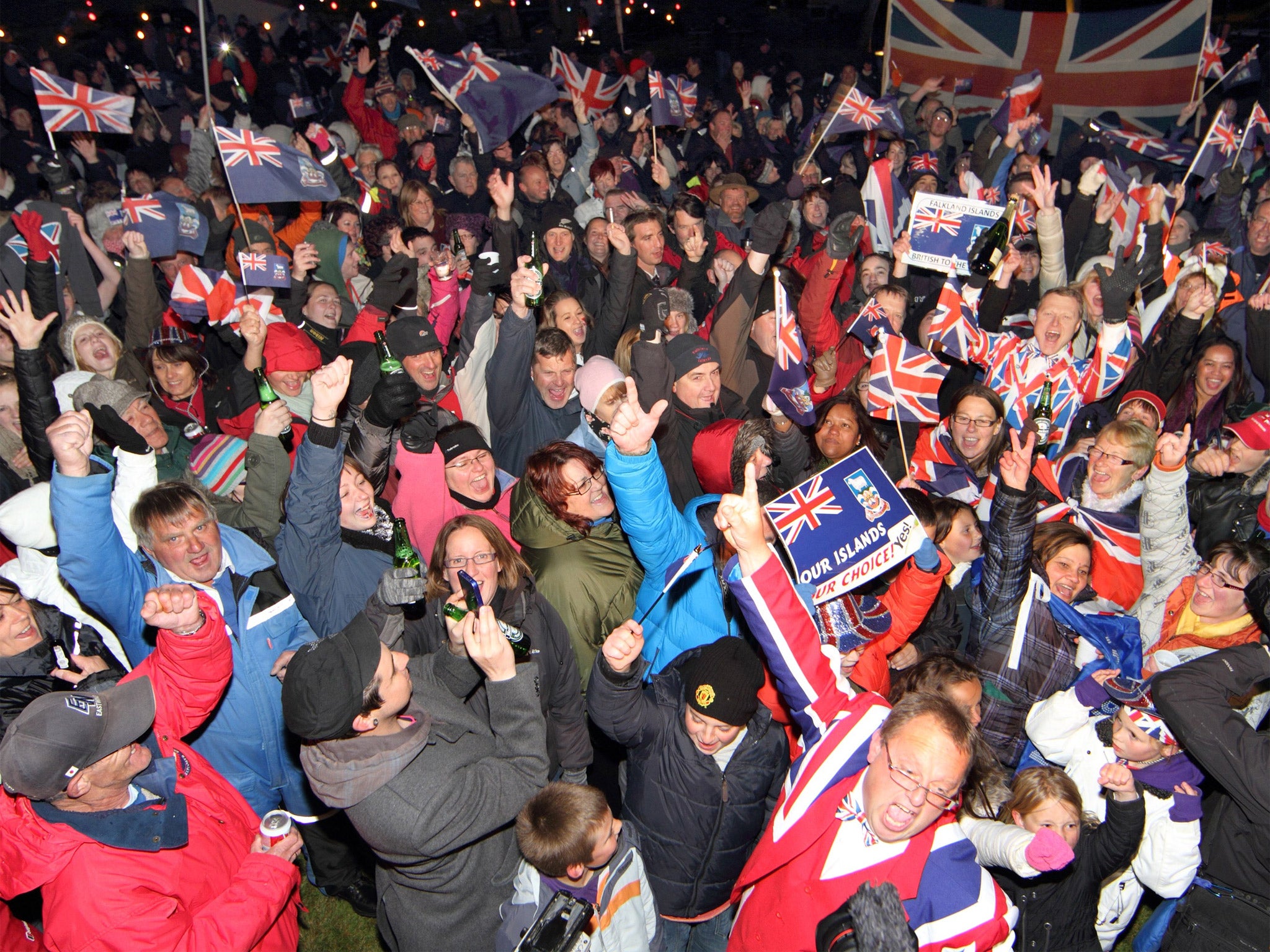Falklands referendum: islanders celebrate diplomatic two-fingered salute to Argentina and speculate on identity of mystery 'three' who voted against maintaining British sovereignty
Just three citizens voted against remaining British

Sybie Summers, a sixth-generation Falklander, was pretty sure of the fate deserved by the shadowy cell of refusniks known on the streets of Port Stanley as “The Three”. With a steely stare, she said: “They can have a one-way plane ticket. Marked ‘Do not return’.”
As the diminutive capital of the Falkland Islands awoke bleary-eyed from a night of partying to celebrate its overwhelming 99.8 per cent “yes” vote in favour of remaining British, widely applauded here as a diplomatic two-fingered salute to Buenos Aires, the hunt was on for the brave or foolish 0.2 per cent of the electorate who, whisper it, said “no”.
State-of-the art election analysis carried out by The Independent on the back of an envelope showed that out of 1,517 citizens who cast valid votes in the islands’ two-day referendum on maintaining British sovereignty a grand total of three had swum against the political tide.
The reasons behind such electoral dissent left many who had danced the night away wrapped in Union flags to keep out the Antarctic wind scratching their heads. Were they informed votes for independence? Or were they a treacherous call to raise the Argentine flag over Government House? But most important of all – in a territory the size of Wales with a population the size of a small English village – what were the identities of this non-conformist trio?
In the Pod gift shop on Stanley’s quayside, whose steady stream of customers from visiting cruise ships has diminished significantly in recent months due to an Argentine ban on such vessels visiting its own shores, there was little appetite for magnanimity.
Mrs Summers, said: “I don’t know who they are but if they’re not standing up for our islands then they shouldn’t be here. We never turn anyone away from these islands but if that is how they feel then they can have a one way plane ticket out of here. Marked ‘Do not return’.”
Asked whether the no votes might have been the expression of an embryonic desire for this increasingly wealthy and confident one-time outpost of empire to one day loosen the apron strings with the Mother Country, she added: “I think that’s being too generous.”
Sadly, The Independent’s hunt for this vanishingly-rare new political beast among the 3,000 islanders – around 2,000 of them living in Stanley’s quiet haven of brightly-painted, tin-roofed houses, proved less than fruitful.
One man, identified as a possible referendum objector and who asked not to be named, responded as if asked whether he murdered puppies for a living: “Christ no. Where did you get that from? I’m all for us exploring greater autonomy eventually but there was really only one way to vote this time. It had to be yes. We have to be united.”
At one point, a rumour began to circulate that one of the no voters had been defiantly expressing their opinions in one of Stanley’s cafés. Further enquiries revealed it was in fact a visiting Eurosceptic who had been railing against the inadequacies of the European Union and Britain’s continued membership. He had also left a fortnight earlier.
Others muttered darkly about “troublemakers” in the community with links to Argentina, an unfair and insulting bit of finger-pointing considering that Falklanders with Argentine family ties tend to be among the most sharply critical of the 1982 invasion and the staunchest supporters of the islands’ British identity.
In Deanos Bar, a favourite watering hole for small groups of troops when a night pass from the British garrison 50 minutes outside Stanley, Wayne Leo, a St Helenian who has lived in Stanley for 12 years, said: “Whoever they are, they will be keeping their heads down. I think if you voted no, with everyone so happy about the yes vote, it might not be a good idea to identify yourself. Nothing would happen. But people also have long memories here.”
Indeed, for every resident irritated by the no voters, there were likely many more who saw it as valuable evidence of a vigorous debate and democracy on the islands. Behind the scenes, organisers had in fact been concerned that an untrammelled yes vote would have run the risk of making the Falklands look like it had more in common with North Korea than Britain.
Jan Cheek, one of the islands’ elected legislators, told The Independent: “I think those votes give our referendum credibility. If it had been 100 per cent in favour, it would have been very suspicious.”
One official added that if islanders wanted to criticise then a better focus for their ire would have been the 132 Falklanders who had registered to vote in the referendum but then chose not to cast their ballots.
Instead, on the morning after a predictable but no less historic vote, islanders were more interested in the opinion of the world, and in particular Argentine president Cristina Fernandez de Kirchner, than a witch hunt within their own ranks.
Gavin Short, another legislator, said: “For the first time in our long history there can be no misinterpretation as to how we feel about our relationship with Britain. President Fernandez de Kirchner we have sent you a message: we have absolutely no desire to be ruled by the government in Buenos Aires. I hope now that you might respect that.”
Join our commenting forum
Join thought-provoking conversations, follow other Independent readers and see their replies
Comments
Bookmark popover
Removed from bookmarks